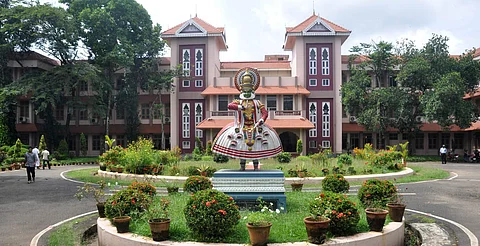

As a thank you note and also to honour their teacher's contributions to Science, a group of researchers who discovered a new species of isopod pathogens decided to name the organism after him. The new species of isopod pathogens, named Norileca hathai, was discovered in the Indian Ocean, predominantly in the Andaman Sea by researchers Nashad M, Dr Aneesh PP, Prof Bijukumar A and Dr K Bineesh.
According to Dr Mohamed Hatha, Professor and Head of the Department of Marine Biology, Cochin University of Science and Technology (CUSAT), the new species was discovered by one of his PhD students, Nashad M, who is currently a senior technical officer with the Fishery Survey of India. "Nashad has been studying isopod pathogens in fish in the Indian Ocean, predominantly in the Andaman Sea. He, along with the other researchers, came across a new parasitic species inhabiting the gill of the fish Caranx (Vatta in Malayalam)," shared the professor with TNIE. According to Aneesh PP, the researchers decided to name the pathogen after Hatha to honour his contributions to Science. Accordingly, the new species has been named Norileca hathai.
"The new finding has been published in the recent issue of the leading international journal Marine Biodiversity Records," said Hatha. According to Nashad, Norileca hathai have a pale tan body with large dark stripes posteriorly and can grow up to 12 to 15 mm in size. "It attaches itself to the host using pointed appendages called pereopods and feeds on fish blood without killing the host. More than fifty species of parasitic isopods occur in Indian waters, infesting various groups of fishes like mackerel, sardines, barracudas and silver bellies," he said.
Detailing Dr Hatha's contributions, Aneesh said, "The key areas of Dr Hatha's research have been microbial pathogens, especially the antibiotic-resistant organisms, their mode of survival and their spread in different locations including the polar regions. He has visited the North Pole three times as the leader of the Indian Arctic expedition team in 2009, field participant in 2011 and 2016, and the Antarctic in 2020 as part of his research on microbial communities in these remote regions." He has been teaching and researching for the past two-and-a-half decades and has taught at various universities in India and abroad.
Aneesh said, "An earlier find had been named after my guide Dr Bijukumar A. So, this time around, we decided to honour Dr Hatha, who is also Nashad's guide." According to Nashad, Dr Hatha's is a recipient of the coveted Fulbright Scholarship of the US government and has been appointed the Country Ambassador of the American Society of Microbiology (ASM), the leading scientific society in the world. "There are only 200 ASM ambassadors worldwide. The state government has also included me as a member of the Kerala State Planning Board (Science and Technology working group) for this plan period," said Nashad.
